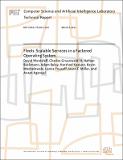Fleets: Scalable Services in a Factored Operating System
Author(s)
Wentzlaff, David; Gruenwald, Charles, III; Beckmann, Nathan; Belay, Adam; Kasture, Harshad; Modzelewski, Kevin; Youseff, Lamia; Miller, Jason E.; Agarwal, Anant; ... Show more Show less
DownloadMIT-CSAIL-TR-2011-012.pdf (817.3Kb)
Other Contributors
Computer Architecture
Advisor
Anant Agarwal
Metadata
Show full item recordAbstract
Current monolithic operating systems are designed for uniprocessor systems, and their architecture reflects this. The rise of multicore and cloud computing is drastically changing the tradeoffs in operating system design. The culture of scarce computational resources is being replaced with one of abundant cores, where spatial layout of processes supplants time multiplexing as the primary scheduling concern. Efforts to parallelize monolithic kernels have been difficult and only marginally successful, and new approaches are needed. This paper presents fleets, a novel way of constructing scalable OS services. With fleets, traditional OS services are factored out of the kernel and moved into user space, where they are further parallelized into a distributed set of concurrent, message-passing servers. We evaluate fleets within fos, a new factored operating system designed from the ground up with scalability as the first-order design constraint. This paper details the main design principles of fleets, and how the system architecture of fos enables their construction. We describe the design and implementation of three critical fleets (network stack, page allocation, and file system) and compare with Linux. These comparisons show that fos achieves superior performance and has better scalability than Linux for large multicores; at 32 cores, fos's page allocator performs 4.5 times better than Linux, and fos's network stack performs 2.5 times better. Additionally, we demonstrate how fleets can adapt to changing resource demand, and the importance of spatial scheduling for good performance in multicores.
Date issued
2011-03-09Series/Report no.
MIT-CSAIL-TR-2011-012
Keywords
multicore, scalable operating system